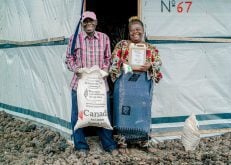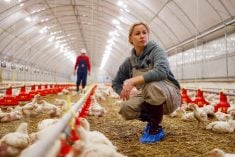UPDATED at 10:15 a.m. CST: Two more poultry farms in British Columbia’s Fraser Valley are under quarantine as a precaution to contain the spread of avian influenza, the Canadian Food Inspection Agency said yesterday.
The two broiler breeder farms are located between two farms near Abbotsford and Chilliwack where avian influenza was announced Tuesday.
Avian influenza has not been positively identified in the two new farms, said Dr. Harpreet Kochhar, the CFIA’s chief veterinary officer.
Birds from the newly quarantined barns were moved from one of the original index farms last Friday.
Read Also

B.C. ostriches culled, CFIA confirms
Ostriches on an embattled Edgewood, B.C. farm have been culled after a prolonged legal battle, the Canadian Food Inspection Agency has confirmed.
A turkey farm near Abbotsford and a broiler barn near Chilliwack tested positive for the presence of H5 avian influenza after both operations experienced sudden deaths of birds over the weekend.
All 11,000 turkeys were destroyed. They were destined for the Christmas market.
About 1,000 of the 7,000 broilers at the Abbotsford farm had died. The rest were destroyed.
CFIA has not released the number of birds in the newly quarantined barns. They too will be destroyed and compensation paid to the producer.
Kochhar also warned that other barns may be quarantined in upcoming days.
“As avian influenza is highly contagious and can spread rapidly, it is possible additional farms may be identified in the coming days,” Kochhar said in a technical briefing yesterday.
“There is also a risk, given that there is an integrated poultry industry in the Fraser Valley, that there might be other situations which other at-risk farms are identified.”
He said avian influenza is not a risk to food safety when the meat is cooked properly. It generally isn’t a risk to humans who don’t have consistent contact with infected birds.
No workers have shown signs of avian influenza, said Dr. Perry Kendall, provincial health officer with the health ministry.
Kochhar said officials haven’t determined the exact type of H5 avian influenza, but based on how quickly the birds died, it is a “very virulent one.” Results should be announced this afternoon.
Officials with the CFIA, the B.C. government and the poultry industry are trying to determine how the virus could have entered the farms. They are investigating a link between migratory birds or breaches in biosecurity.
Hong Kong has suspended imports of all poultry and poultry products for human consumption from the Fraser Valley since the avian flu announcement.
Kochhar said they are talking with officials in the United States, the European Union and Japan about the outbreak and the measures they are taking to control its spread.
“It is expected in the international circles there might be some more reaction to this.”
Kochhar hopes any trade blockage will be limited to poultry facilities from the Fraser Valley and not include poultry from other parts of Canada or B.C.
It is not the first time avian influenza has been discovered in Canada. A similar H5 avian influenza strain was detected in 2004 and 2005 in B.C. and 2010 in Manitoba.
Contact mary.macarthur@producer.com














